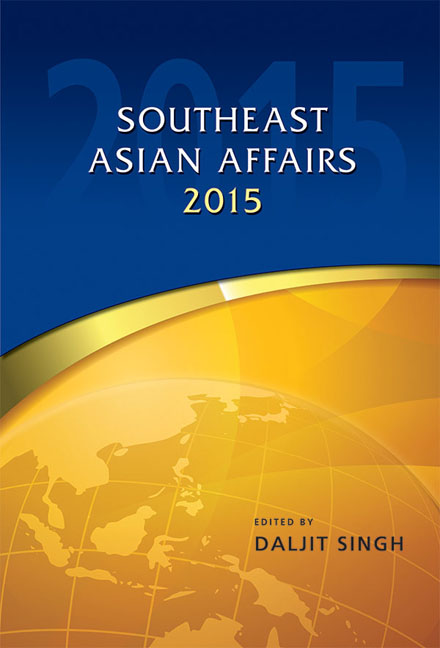Book contents
- Frontmatter
- Contents
- Foreword
- Introduction
- Acknowledgements
- THE REGION
- BRUNEI DARUSSALAM
- CAMBODIA
- Cambodia in 2014: The Beginning of Concrete Reforms
- The Cambodian People Have Spoken: Has the Cambodian People's Party Heard?
- INDONESIA
- LAOS
- MALAYSIA
- MYANMAR
- THE PHILIPPINES
- SINGAPORE
- THAILAND
- TIMOR-LESTE
- VIETNAM
Cambodia in 2014: The Beginning of Concrete Reforms
from CAMBODIA
Published online by Cambridge University Press: 19 May 2017
- Frontmatter
- Contents
- Foreword
- Introduction
- Acknowledgements
- THE REGION
- BRUNEI DARUSSALAM
- CAMBODIA
- Cambodia in 2014: The Beginning of Concrete Reforms
- The Cambodian People Have Spoken: Has the Cambodian People's Party Heard?
- INDONESIA
- LAOS
- MALAYSIA
- MYANMAR
- THE PHILIPPINES
- SINGAPORE
- THAILAND
- TIMOR-LESTE
- VIETNAM
Summary
The July 2013 General Elections was a critical turning point in the modern history of Cambodian political development and democratization. The predominant role of the Cambodian People's Party (CPP) with the long-serving Prime Minister Hun Sen was challenged for the first time in twenty years. The results of the 2013 election illustrated the narrowing political power base of the ruling CPP and the increasing popularity of the opposition Cambodia National Rescue Party (CNRP).
It is the first time the opposition party gained such a strong power base. The popular votes for both parties were roughly equal (CPP received 3,235,969 votes — 48.83 per cent and CNRP received 2,946,176 votes — 44.46 per cent). In terms of seats at the National Assembly, the CPP got sixty-eight seats while the CNRP got fifty-five seats, signifying the narrowing of political gap and the emergence of political power transformation in Cambodia.
2014 was a year full of controversies and complexities but was also a year of hope. There are strong political pressures and impetus to reform state institutions to be accountable to the people. Fruitful reform results are expected if both parties can effectively work together to serve their people and national interests.
Economic growth rate remains high and the current 20 per cent poverty rate is expected to be reduced by 1 per cent per annum. However, bureaucratic capacity, political leadership, good governance and human capital are the main constraints in maintaining high economic growth and promoting socio-economic equity and inclusiveness.
Social dynamics (socio-economic inequality, social injustice, and social trust issues) are posing a serious threat to national stability and well-being. Without efficiently and effectively addressing such social issues, Cambodia may fall into political, social and economic crisis in the coming years. Clean and accountable government needs to be strengthened at both the national and local levels in order to improve the trust between society and state.
In terms of diplomacy, Cambodia has strengthened bilateral ties with Thailand, Vietnam and China. Bilateral relations with Thailand face new challenges after the coup in Thailand in May although both sides are trying to carefully manage ties. Relations with Vietnam have strengthened remarkably especially in economic cooperation although they face certain challenges coming from the opposition party in Cambodia. Relations with China continue to develop fast.
- Type
- Chapter
- Information
- Southeast Asian Affairs 2015 , pp. 89 - 101Publisher: ISEAS–Yusof Ishak InstitutePrint publication year: 2015

